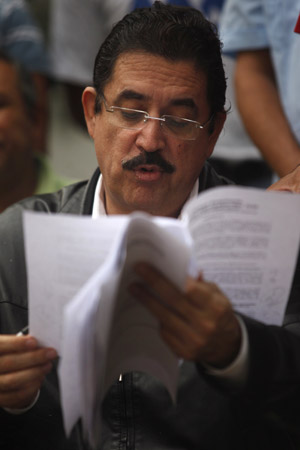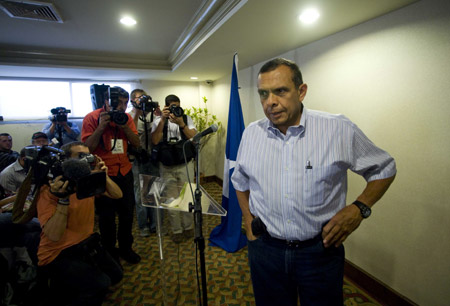Honduras to hold elections amid political crisis
Hondurans vote on Sunday in the country's general elections amid a tense political crisis following a military-backed coup that ousted President Manuel Zelaya and sent him into exile in Costa Rica on June 28.
 |
|
Honduras' ousted President Manuel Zelaya reads the document "Dialogue Guaymuras. Tegucigalpa-San JosAccords" during an interview with a local radio station, inside the Brazilian embassy in Tegucigalpa October 31, 2009. [Xinhua] |
About 4.6 million Hondurans registered to vote on Sunday to choose the country's president, three vice presidents, 128 deputies to the National Congress, 20 members of the Central American parliament, and 298 mayors among more than 13,000 candidates.
The government has and deployed 5,000 troops across the nation and barred the wearing of guns to guarantee security.
The winner of the presidential election is scheduled to take office on Jan. 27, 2010 for a four-year term.
Among the five presidential candidates, only two were believed to stand greater chance to win the presidency: Porfirio Lobo of the National Party and Elvin Santos of the Liberal Party.
These two parties have been the strongest political parties in Honduras and have been alternating power since the end of the 19th Century.
 |
|
Porfirio Lobo Sosa, the candidate from the right-wing National Party takes an interview in Tegucigalpa, capital of Honduras, Nov. 27, 2009. [David de la Paz/Xinhua] |
The Sunday elections were rejected by many countries. Both Brazilian President Luiz Inacio Lula da Silva and Argentine President Cristina Kirchner have demanded the restitution of President Zelaya as a way to reestablish constitutional order and democracy in the country.
By contrast, the United States, Panama, and Peru said they would recognize the outcome of the elections as they are under way.
 0 Comments
0 Comments







Comments